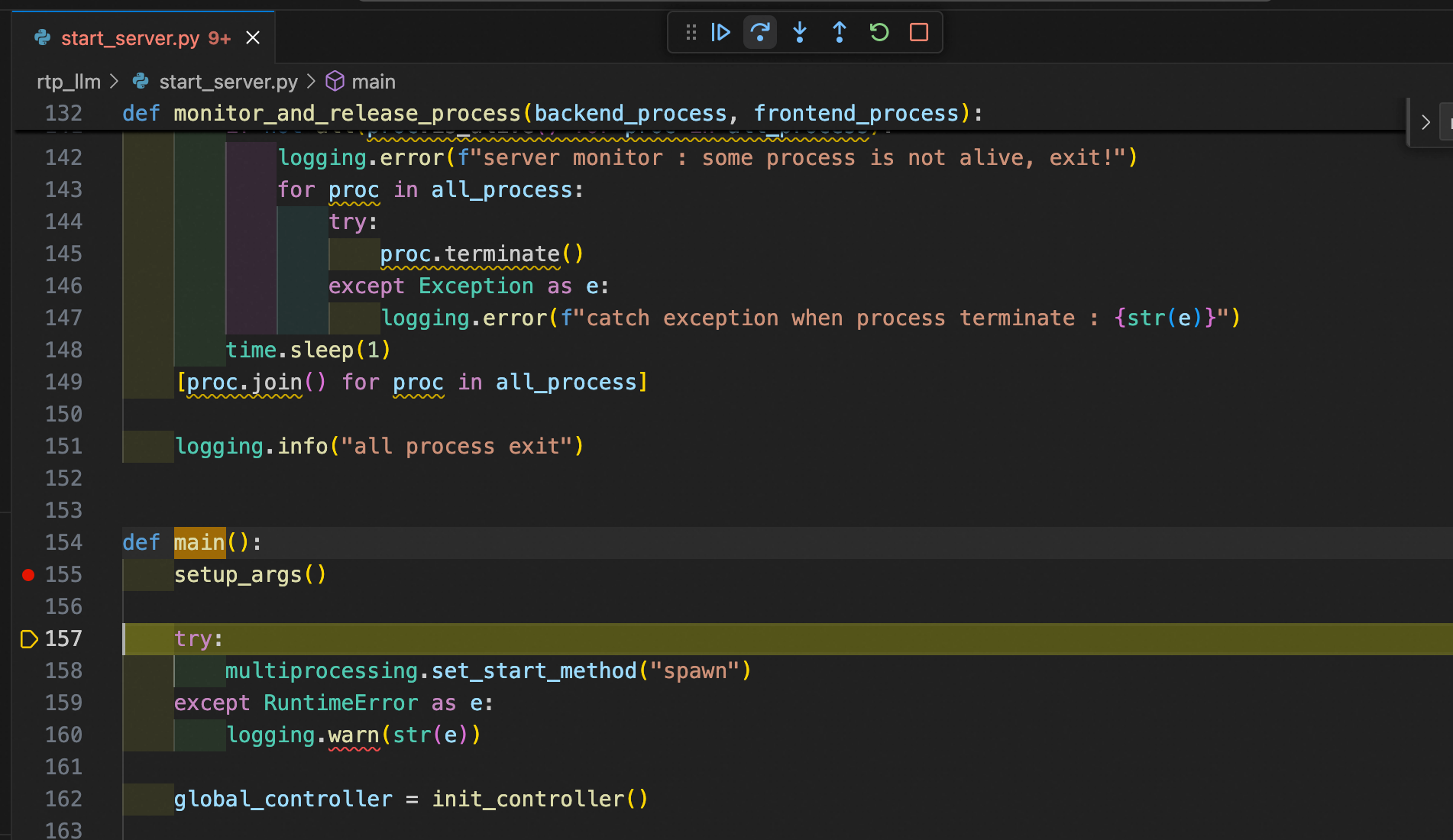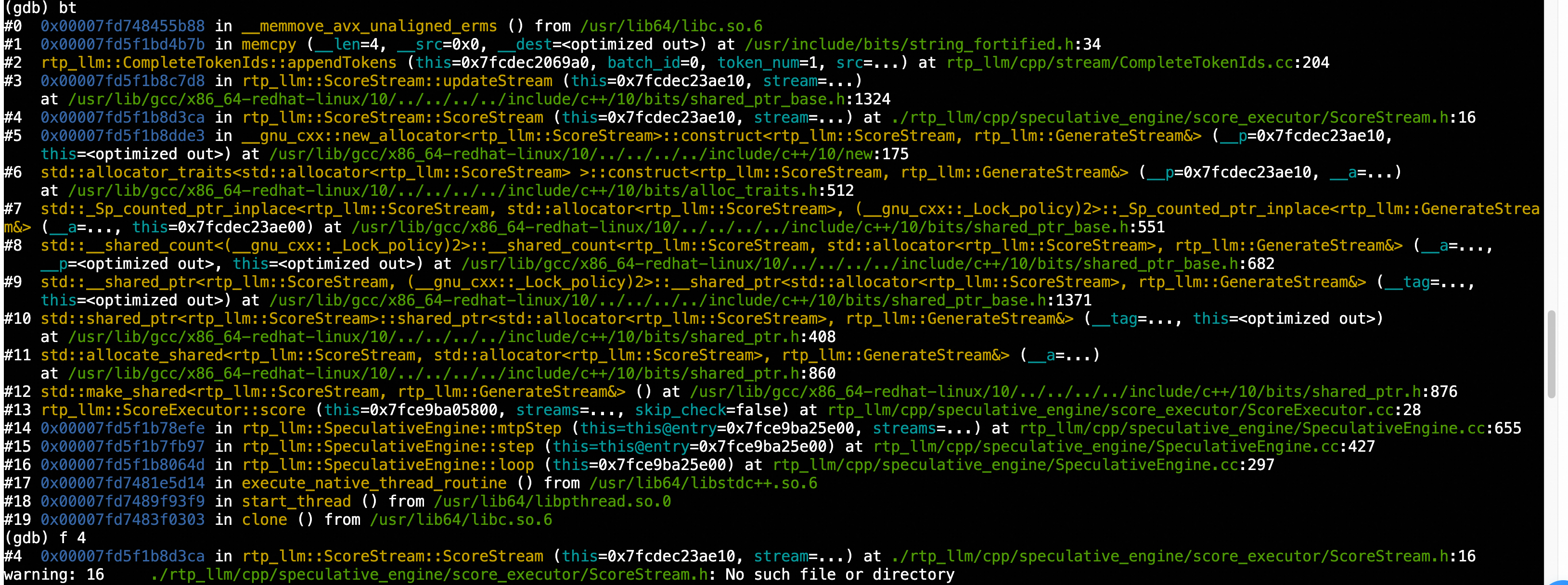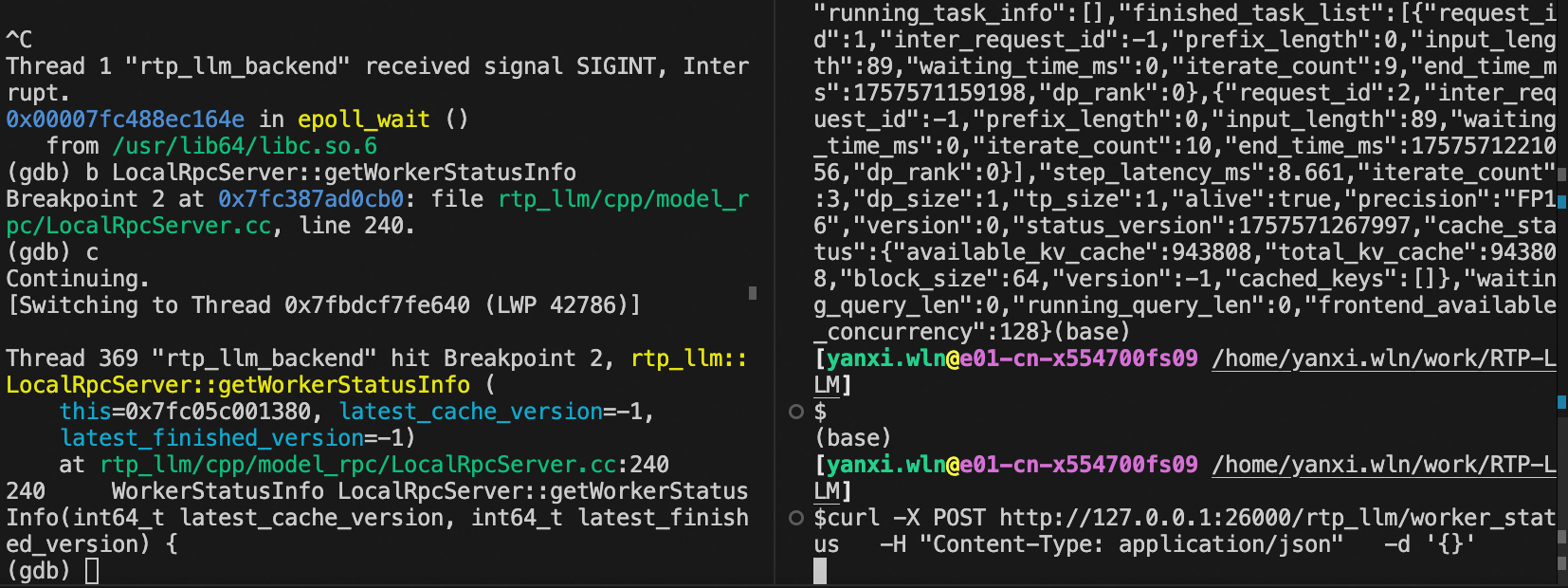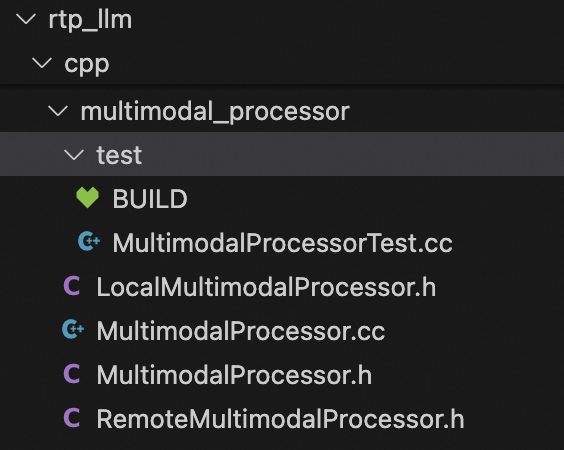Debugging RTP-LLM#
The RTP-LLM project uses the Bazel build system. After learning how to compile and run RTP-LLM locally from scratch, this article will explain how to debug the code. Since RTP-LLM is primarily composed of a combination of Python and C++ code, we will introduce several commonly used debugging methods in this guide.
Debug Python Part#
Method 1: logging or print#
When running the debug mode locally, modify the self.frontend_server_count = 4 to 1 in the ServerConfig class within rtp_llm/config/py_config_modules.py. This change ensures only one frontend server is launched, allowing print statements and logging outputs to be directly displayed in the terminal.
Method 2: python debugger#
Assuming we already have an existing container, access it and set up an SSH port mapping to enable remote connections.
sudo ssh-keygen -A
sudo /usr/sbin/sshd -p 37228
Access the container via the SSH extension in VS Code.
Host dev-container
HostName ip
User user
Port 37228
After accessing the container via VS Code, ensure the Python debugger extension is installed within the container.

Write the launch.json configuration file for debugging. Here’s an example of a VS Code launch.json configuration file for debugging Python and C++ code in the RTP-LLM project (adjust paths as needed):
{
"version": "0.2.0",
"configurations": [
{
"name": "Run RTP-LLM with Qwen2-0.5B",
"type": "debugpy",
"request": "launch",
"program": "${file}",
"cwd": "${path/to/project}/RTP-LLM/",
"env": {
"PYTHONPATH": "$PYTHONPATH:${path/to/project}/RTP-LLM",
"PYTHON_BIN": "/opt/conda310/bin/python",
"CUDA_VISIBLE_DEVICES": "2,3",
"CHECKPOINT_PATH": "/mnt/nas1/hf/Qwen2-0.5B",
"TOKENIZER_PATH": "/mnt/nas1/hf/Qwen2-0.5B",
"MODEL_TYPE": "qwen_2",
"LD_LIBRARY_PATH": "",
"TP_SIZE": "2",
"DP_SIZE": "1",
"EP_SIZE": "2",
"WORLD_SIZE": "2",
"LOCAL_WORLD_SIZE": "1",
"MAX_SEQ_LEN": "1024",
"MAX_CONTEXT_BATCH_SIZE": "1",
"CONCURRENCY_LIMIT": "8",
"RESERVER_RUNTIME_MEM_MB": "4096",
"WARM_UP": "1",
"START_PORT": "61348",
"NSIGHT_PERF": "0",
"CUDA_ASAN": "0"
},
"args": []
},
],
}
Set up the required environment variables before running or debugging the code.
#!/bin/bash
set -x;
## set python path
export PYTHON_BIN=/opt/conda310/bin/python;
## set user home
export USER_HOME=${/path/to/home};
export PYTHONUNBUFFERED=TRUE;
export PYTHONPATH=${path/to/project}/:${PYTHONPATH}
export PY_LOG_PATH=${path/to/project}/logs
export CHECKPOINT_PATH="/mnt/nas1/hf/Qwen2-0.5B";
export TOKENIZER_PATH=${CHECKPOINT_PATH}
export MODEL_TYPE="qwen_2";
export LD_LIBRARY_PATH=/opt/conda310/lib/:/usr/local/nvidia/lib64:/usr/lib64:/usr/local/cuda/lib64:/usr/local/cuda-12.6/extras/CUPTI/lib64/
export TP_SIZE=2
export DP_SIZE=1
export EP_SIZE=$((TP_SIZE * DP_SIZE))
export WORLD_SIZE=$EP_SIZE
export LOCAL_WORLD_SIZE=$EP_SIZE
## request max token number
export MAX_SEQ_LEN=8192
export MAX_CONTEXT_BATCH_SIZE=1
export CONCURRENCY_LIMIT=8
export RESERVER_RUNTIME_MEM_MB=4096
export WARM_UP=1
export START_PORT=61348
export NSIGHT_PERF=0
export CUDA_ASAN=0
export DEVICE_RESERVE_MEMORY_BYTES=-20480000
open the file containing start_server.py, set breakpoints, and begin debugging.

Debug C++ Part#
Method 1: logging#
Add the following log statements for output:
RTP_LLM_LOG_DEBUG("request [%ld] enqueue success", request_id);
other similar functions include:
RTP_LLM_LOG_INFO
RTP_LLM_LOG_WARNING
RTP_LLM_LOG_ERROR
Set the log level using the LOG_LEVEL=”INFO” environment variable.
Method 2: GDB debug#
GDB debug core#
When the code crashes with a core dump in the container, a core file is generated (e.g., core-rtp_llm_backend-78933-1757510512). To debug:
gdb /opt/conda310/bin/python3 core-rtp_llm_backend-78933-1757510512
After loading the core file into GDB, run the bt (backtrace) command to display the error stack trace.

f 4 # check rtp_llm::ScoreStream::ScoreStream info
info locals
p stream

check propose_stream_ info
p *(this->propose_stream_._M_ptr->sp_output_buffer_._M_ptr->tokens._M_ptr)
check tokens info

A null pointer (data_ = 0) was detected, causing a memcpy error.
GDB debug process#
MODEL_TYPE=qwen_7b \
CHECKPOINT_PATH=/mnt/nas1/hf/Qwen-7B-Chat/ \
TOKENIZER_PATH=/mnt/nas1/dm/qwen_sp/qwen_tokenizer \
TP_SIZE=1 \
SP_TYPE=vanilla \
GEN_NUM_PER_CIRCLE=5 \
SP_MODEL_TYPE=qwen_1b8 \
SP_CHECKPOINT_PATH=/mnt/nas1/hf/qwen_1b8_sft/ \
WARM_UP=1 \
INT8_MODE=1 \
SP_INT8_MODE=1 \
REUSE_CACHE=1 \
START_PORT=26666 \
/opt/conda310/bin/python3 -m rtp_llm.start_server
After starting the service, you can view the relevant processes as follows:
A rtp_llm_backend_server process will be running as the main process for the inference service. If TP_SIZE=2 is set, you will see two child processes (e.g., rank-0 and rank-1) for tensor parallelism. A rtp_llm_frontend_server_0 frontend service process will be active to handle external requests.
yanxi.w+ 40954 40801 44 14:03 pts/8 00:00:41 rtp_llm_backend_server
yanxi.w+ 41356 40801 20 14:04 pts/8 00:00:11 rtp_llm_frontend_server_0
To begin debugging with GDB: Attach GDB to the target process (e.g., PID 40954):
gdb -p 40954
Set breakpoints in the code Use curl to send a test request and trigger the breakpoint:
curl -X POST http://127.0.0.1:26000/v1/chat/completions -H "Content-Type: application/json" -d '{
"messages": [
{
"role": "user",
"content": "What's the WEATHER like in Hangzhou?"
}
],
"stream": false,
"aux_info": true,
"max_tokens": 10
}'
The breakpoint will be triggered, and you can then examine the code path by inspecting the stack trace.

Method 3: Unit Test#
Example: Unit Testing for the ViT Module
File Structure of the ViT Module

Steps to Create Unit Tests Create Test Files:
Add a .cc test file (e.g., multimodal_processor_test.cc) under the test directory. Write Google Test (gtest) cases using assertions like EXPECT_EQ to validate behavior.
#include <gtest/gtest.h>
TEST(MultimodalProcessorTest, BasicFunctionality) {
// Test logic here
EXPECT_EQ(result, expected_value);
}
Define the BUILD File:
cc_test(
name = "multimodal_processor_test",
srcs = ["multimodal_processor_test.cc"],
deps = [
"//rtp_llm/cpp/multimodal_processor:main_lib",
"@gtest//:gtest_main",
],
)
Run the Test: Execute the following command in the project’s container:
bazelisk test rtp_llm/cpp/multimodal_processor/test:multimodal_processor_test --jobs=48 --test_output=streamed --config=cuda12_6
Debug Running Server#
To retrieve debugging information via a curl request, use the following command with verbose output:
Enabling aux_info: true and debug_info: true in the request will return additional auxiliary information and debugging details.
curl -X POST http://127.0.0.1:26000/v1/chat/completions -H "Content-Type: application/json" -d '{
"messages": [
{
"role": "user",
"content": "What's the WEATHER like in Hangzhou?"
}
],
"stream": false,
"aux_info": true,
"max_tokens": 10,
"debug_info": true
}'
response:
{
"id": "chat-",
"object": "chat.completion",
"created": 1757660643,
"model": "",
"choices": [
{
"index": 0,
"message": {
"role": "assistant",
"content": "The weather in Hangzhou is usually wetter in spring and autumn",
"partial": false
},
"finish_reason": "length"
}
],
"usage": {
"prompt_tokens": 34,
"total_tokens": 44,
"completion_tokens": 10
},
"debug_info": {
"input_prompt": "<|im_start|>system\nYou are Qwen, created by Alibaba Cloud. You are a helpful assistant.<|im_end|>\n<|im_start|>user\nWhat's the WEATHER like in Hangzhou?<|im_end|>\n<|im_start|>assistant\n",
"input_ids": [
151644, 8948, 198, 2610, 525, 1207, 16948, 11, 3465, 553, 54364, 14817, 13,
1446, 525, 264, 10950, 17847, 13, 151645, 198, 151644, 872, 198, 104130,
9370, 104307, 104472, 11319, 151645, 198, 151644, 77091, 198
],
"input_urls": [],
"tokenizer_info": "Qwen2TokenizerFast(...完整tokenizer信息...)",
"max_seq_len": 16384,
"eos_token_id": 151645,
"stop_word_ids_list": [[151645], [151644], [37763, 367, 25], [151643]],
"stop_words_list": ["<|im_end|>", "<|im_start|>", "Observation:", "<|endoftext|>"],
"renderer_info": {
"class_name": "QwenRenderer",
"renderer_model_type": "qwen_2",
"extra_stop_word_ids_list": [[37763, 367, 25], [151643]],
"extra_stop_words_list": ["Observation:", "<|endoftext|>"],
"template": "...(Complete template content)..."
}
},
"generate_config": {
"max_new_tokens": 10,
"max_input_tokens": 32000,
"max_thinking_tokens": 32000,
"in_think_mode": false,
"end_think_token_ids": [],
"num_beams": 1,
"variable_num_beams": [],
"do_sample": true,
"num_return_sequences": 0,
"top_k": 0,
"top_p": 1.0,
"temperature": 0.7,
"repetition_penalty": 1.0,
"presence_penalty": 0.0,
"frequency_penalty": 0.0,
"min_new_tokens": 0,
"stop_words_str": ["<|im_end|>", "<|im_start|>", "Observation:", "<|endoftext|>"],
"stop_words_list": [[151645], [151644], [37763, 367, 25], [151643], [151645], [151644]],
"using_hf_sampling": false,
"print_stop_words": false,
"timeout_ms": 3600000,
"ttft_timeout_ms": -1,
"traffic_reject_priority": 100,
"request_format": "raw",
"calculate_loss": 0,
"return_logits": false,
"return_incremental": false,
"return_hidden_states": false,
"hidden_states_cut_dim": 0,
"normalized_hidden_states": false,
"select_tokens_str": [],
"select_tokens_id": [],
"return_input_ids": false,
"return_output_ids": false,
"md5_value": "",
"custom_prop": "{}",
"sp_advice_prompt": "",
"sp_advice_prompt_token_ids": [],
"sp_edit": false,
"force_disable_sp_run": false,
"force_sp_accept": false,
"return_cum_log_probs": false,
"return_all_probs": false,
"return_softmax_probs": false,
"can_use_pd_separation": true,
"gen_timeline": false,
"profile_step": 3,
"out_prefix": "",
"role_addrs": [],
"inter_request_id": -1,
"ignore_eos": false,
"skip_special_tokens": false,
"is_streaming": false,
"add_vision_id": true,
"tool_call_message_extract_strategy": "default",
"global_request_id": -1,
"reuse_cache": true,
"enable_3fs": true
},
"aux_info": {
"cost_time": 95.082,
"iter_count": 10,
"prefix_len": 0,
"input_len": 34,
"reuse_len": 0,
"output_len": 10,
"step_output_len": 10,
"fallback_tokens": 0,
"fallback_times": 0,
"first_token_cost_time": 16.947,
"wait_time": 0.058,
"pd_sep": false,
"cum_log_probs": [],
"beam_responses": [],
"softmax_probs": [],
"local_reuse_len": 0,
"remote_reuse_len": 0
}
}
Enabling return_softmax_probs: true in the request will return softmax probs details.
curl -X POST http://127.0.0.1:26000/v1/chat/completions -H "Content-Type: application/json" -d '{
"messages": [
{
"role": "user",
"content": "What's the WEATHER like in Hangzhou?"
}
],
"stream": false,
"aux_info": true,
"max_tokens": 10,
"extra_configs": {
"return_softmax_probs": true
}
}'
response:
{
"id": "chat-",
"object": "chat.completion",
"created": 1757661676,
"model": "",
"choices": [
{
"index": 0,
"message": {
"role": "assistant",
"content": "The weather in Hangzhou varies from season to season. Spring warmth",
"partial": false
},
"finish_reason": "length"
}
],
"usage": {
"prompt_tokens": 34,
"total_tokens": 44,
"completion_tokens": 10
},
"aux_info": {
"cost_time": 95.985,
"iter_count": 10,
"prefix_len": 0,
"input_len": 34,
"reuse_len": 0,
"output_len": 10,
"step_output_len": 10,
"fallback_tokens": 0,
"fallback_times": 0,
"first_token_cost_time": 16.835,
"wait_time": 0.061,
"pd_sep": false,
"cum_log_probs": [],
"beam_responses": [],
"softmax_probs": [
0.5396254658699036,
0.46262434124946594,
0.9233724474906921,
0.01102062501013279,
0.9563982486724854,
0.7596278190612793,
0.9906871914863586,
0.5212739706039429,
0.27689263224601746,
0.21558642387390137
],
"local_reuse_len": 0,
"remote_reuse_len": 0
}
}
Additional configuration options are available, such as:
return_logits
return_cum_log_probs
return_incremental
return_hidden_states
return_output_ids
return_input_ids
return_all_probs
